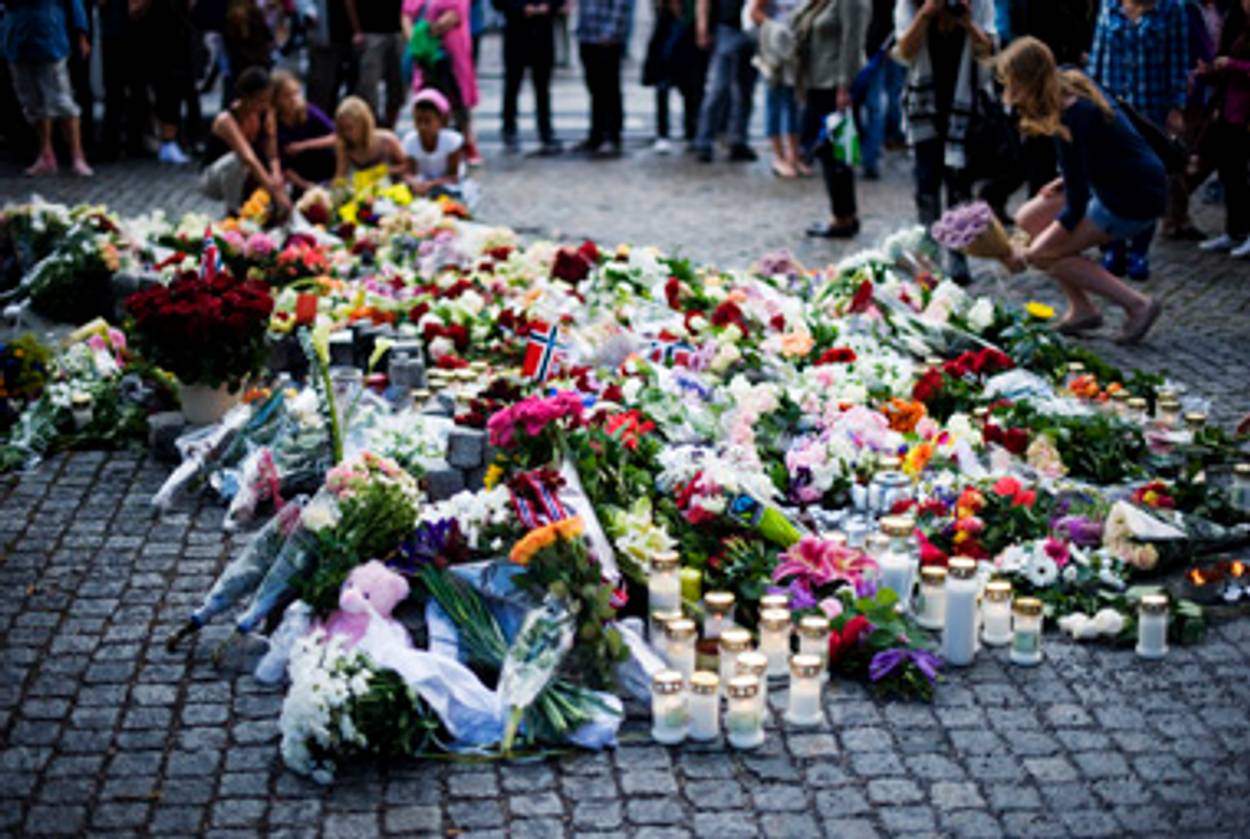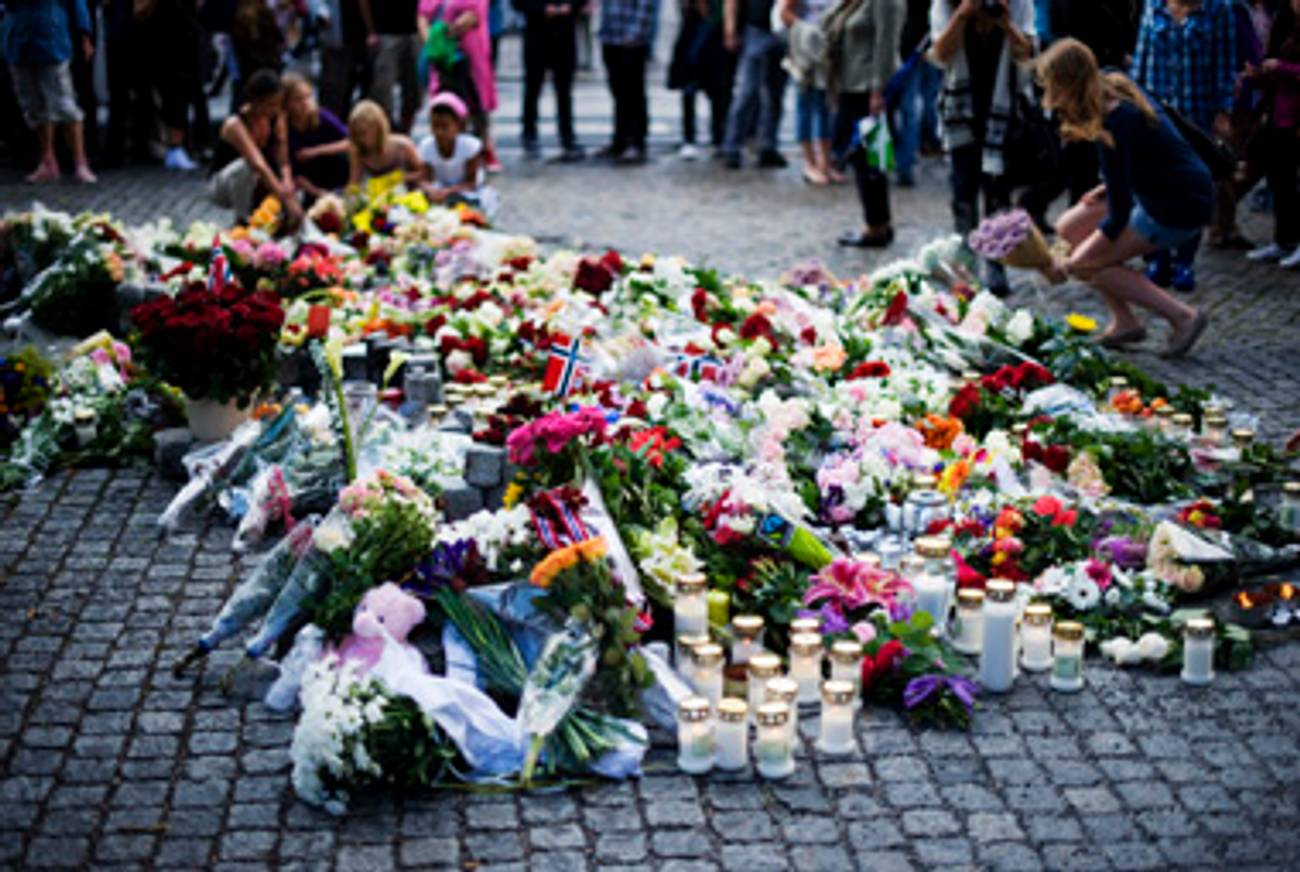What To Make of the Oslo Attacker’s Zionism?
Manifesto by alleged slayer of 92 articulated Islamophobia, ‘Israeli nationalism’




Friday’s horrific attack in and outside Oslo that killed at least 92 has highlighted how the rising European far-right’s virulent Islamophobia has led some of its elements to embrace the state of Israel. Given that the European far right has hosted history’s worst and most effective anti-Semites, this is a remarkable shift.
As far as we know, the suspect, Anders Behring Breivik, 32, acted alone. Yet a 1500-page manifesto he published shows that his views situate him on the far fringe of a much larger movement that has gained great ground in Europe over the last five or 10 years. As the widely respected and tastefully named analyst Marc Sageman put it, Islamist ideology “is the infrastructure from which Al Qaeda emerged. [This milieu is] the infrastructure from which Breivik emerged. This rhetoric is not cost-free.” The manifesto advocated a “cultural conservative political agenda,” condemned multiculturalism, and conjured even the Crusades to make the case against Muslim immigration and Islam generally.
Like many of the far-right parties in various European countries, Breivik also professes “pro-Zionism/Israeli nationalism.” As Daniel Luban noted in Tablet Magazine a year ago, “One of the most striking stories of recent years has been the realignment of segments of the European far right behind a form of militant support for Israel.” Applying the enemy-of-my-enemy form of the transitive principle, these segments—along with Breivik—act primarily out of fear of Muslims, and, in Israel, see a prime manifestation of opposition to Islam. Some Jews have in turn viewed the far-right as an ally. Most prominently, an editorial yesterday in the conservative Jerusalem Post—which, admittedly, not only condemned Breivik specifically but further warned, “Europe’s fringe right-wing extremists present a real danger to society” —argued that, on the question of multiculturalism, Breivik basically got things right. And, as Adar Primor documented in what is now a must-read article from December, some right-wing Israeli politicians have courted the pro-Israel, anti-Islam leaders of right-wing parties from Holland, Belgium, and elsewhere. Primor termed this a “very unholy alliance.”
Spencer Ackerman caught the nuance, if you can call it that, in Breivik’s Zionism. “Jews that support multiculturalism today are as much of a threat to Israel and Zionism (Israeli nationalism) as they are to us,” Breivik argued. “So let us fight together with Israel, with our Zionist brothers against all anti-Zionists, against all cultural Marxists/multiculturalists.” Breivik does not like Jews. He likes a particularly right-wing vision of Israel and (therefore) some Jews—the right-wing Jews who would, he believes, uphold and enforce that vision.
The most revealing of Breivik’s contradictions comes later in the same paragraph: “We must embrace the remaining loyal Jews as brothers rather than repeating the mistake of the NSDAP,” he argues, using the German abbreviation for the National Socialist German Workers’ Party—the Nazis. Elsewhere, an Internet poster believed to be him argued that his movement should “accept the moderate Nazis as long as they distance themselves” from the genocide of the Jews. Any graciousness one might feel toward Breivik for his careful caveat—the Nazis wanted to kill all the Jews, and that was wrong of them!—dissipates when one remembers that Nazism is the elimination of the Jews; that the thought of Nazis who disown killing all the Jews is like the thought of Christians who disown the belief that Jesus was the Messiah, or the thought of Red Sox fans who would go to Fenway and root for the Yankees.
Breivik here helpfully reveals for us the fallacy in thinking that these people on the European far right should be seen by supporters of Israel as kindred, or at least as useful. Their allegiance to Israel may be genuine, if contingent; they may even believe they possess first principles in addition to Islamophobia that would instruct them to support the Jewish state; and even if their Zionism is entirely contingent on their opposition to Muslims, it still could be utilized effectively. But at some point, I submit, it is going to bump up against the very DNA of European ultra-conservatism, which history ancient, modern, and recent indicates has an ineradicable anti-Semitic strain. The bottom line is that these people are not and will never be our friends.
A final point, because why should I let the conservative commenters have all the fun? I have been careful to describe the “European” far right because I actually believe—contra, say, Dan Luban—that America is different. The same lack of baggage that makes multiculturalism a far less potent hot-button issue on this side of the Atlantic and that makes American Muslims far more likely to be integrated, happy, productive members of society and far, far less likely to themselves act on jihadist principles, also makes the alliance between our version of the European Christian far-right (the evangelical Zionists) and our version of the Israeli right-wing (the neoconservatives) far, far less dangerous.
The alliance in the United States is, if anything, more powerful stateside than in Europe. And one can certainly find it troublesome, even unsavory. But whether it was William F. Buckley, Jr., effectively expelling anti-Semites from the nascent conservative movement or the City College boy Irving Kristol deliberately building this alliance, history shows that it could never slip nearly so far down the disastrous slope as that between the European far-right and Israel. I’d add only that the false analogy goes both ways: Those Americans who are content with Dutch nationalists cavorting with Yisrael Beiteinu because it cannot be any worse than Jewish leaders praising Christians United for Israel are mistaken, and are doing their Israeli brothers and sisters a grave disservice.
Police Say Oslo Suspect Admits ‘Facts’ in Massacre [NYT]
Norway Killer Espoused Right-Wing Philosophy Claiming To Be Zionist [JTA]
Norway’s Challenge [JPost]
Oslo Suspect Wrote of Fear of Islam and Plan for War [NYT]
Norway Attacks Put Spotlight on Rise of Right-Wing Sentiment in Europe [NYT]
Breivik and the Jews [Attackerman]
Related: The New Anti-Semitism [Tablet Magazine]
The Unholy Alliance Between Israel’s Right and Europe’s Anti-Semites [Haaretz]
Marc Tracy is a staff writer at The New Republic, and was previously a staff writer at Tablet. He tweets @marcatracy.